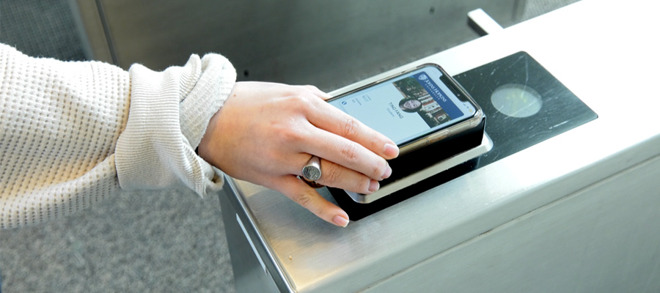Johns Hopkins University students can now use iPhone or Apple Watch as ID
Students at Baltimore's Johns Hopkins University can now use an iPhone or Apple Watch in place of a physical ID card for getting around campus, as well as paying for university services.

Once activated, a digital "J-Card" ID appears in Apple's Wallet app, the Baltimore Sun said on Thursday. With "Express Mode" left on by default, all that's needed is to hold an iPhone or Watch next to a reader -- no Face ID, Touch ID, passcode, or even waking or unlocking a device.
For extra security students can turn Express Mode off, resulting in an experience like Apple Pay. Apple's ID system lets students check their account info via Wallet, such as food and print amounts.
On campus, students will be able to do things like unlock doors, print at the library and buy items at the bookstore. Some off-campus businesses are participating in purchases as well, among them Chipotle, CVS and 7-Eleven.
Johns Hopkins is the fifth U.S. school to support Wallet IDs -- the others are Duke, Temple, Santa Clara, and the Universities of Alabama and Oklahoma. That leaves many others to go, including every Ivy League institution.
Device requirements are relatively low, starting with only an iPhone 6 and/or an Apple Watch Series 1. Users must also download the eAccounts app.

Once activated, a digital "J-Card" ID appears in Apple's Wallet app, the Baltimore Sun said on Thursday. With "Express Mode" left on by default, all that's needed is to hold an iPhone or Watch next to a reader -- no Face ID, Touch ID, passcode, or even waking or unlocking a device.
For extra security students can turn Express Mode off, resulting in an experience like Apple Pay. Apple's ID system lets students check their account info via Wallet, such as food and print amounts.
On campus, students will be able to do things like unlock doors, print at the library and buy items at the bookstore. Some off-campus businesses are participating in purchases as well, among them Chipotle, CVS and 7-Eleven.
Johns Hopkins is the fifth U.S. school to support Wallet IDs -- the others are Duke, Temple, Santa Clara, and the Universities of Alabama and Oklahoma. That leaves many others to go, including every Ivy League institution.
Device requirements are relatively low, starting with only an iPhone 6 and/or an Apple Watch Series 1. Users must also download the eAccounts app.

Comments
Surely that hat could be coded in?
Android does not have a generalised high level framework to do this with - you’d have to code something specific to the NFC implementation on each specific Android device you wanted to support. Not all of them have NFC, so you’d only be able to target some Android vendors anyhow.
The plus side is that Android vendors don’t impose the control on NFC that Apple does, and you can likely put pretty much anything you like in an NFC subsystem tomorrow.